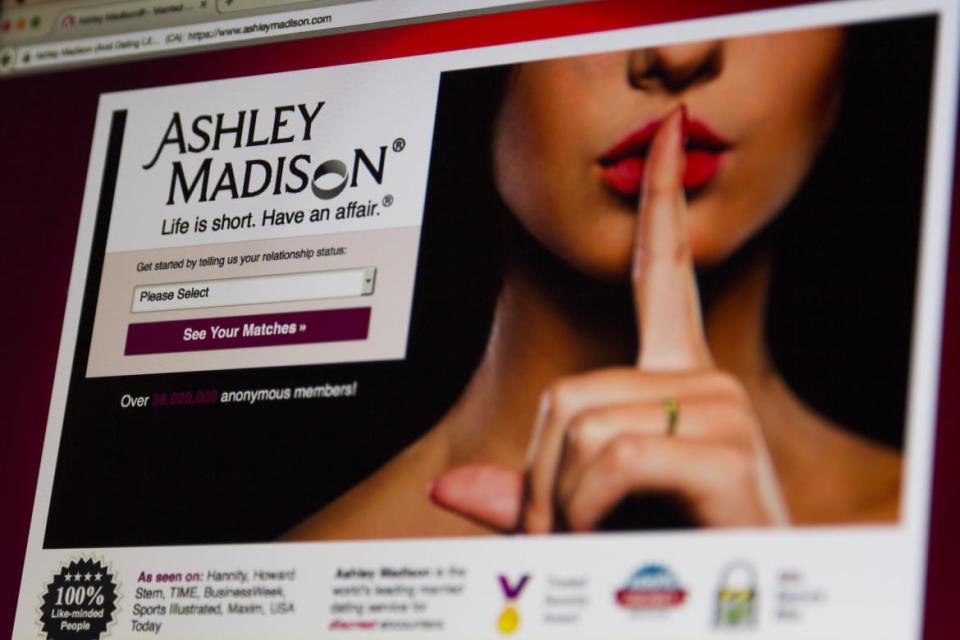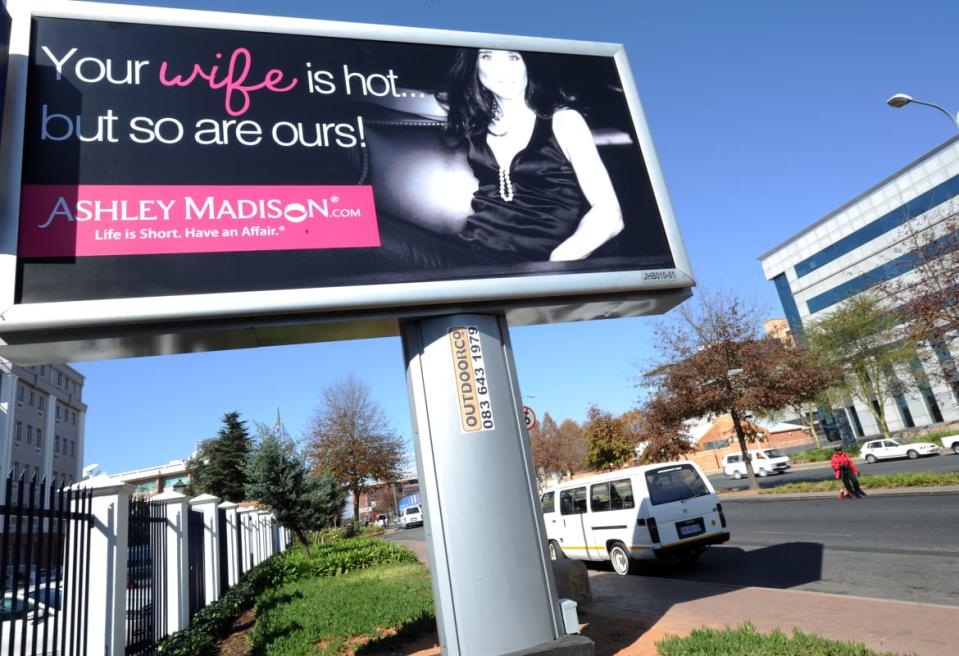How a Scandalous Sex Site Stays Hot in the Era of Throuples

Ah, the scandalous 2010s: Anthony Weiner’s sexts, Fifty Shades of Grey, Arnold Schwarzenegger’s love child. It was in this fecund soil that Ashley Madison—the infamous website dedicated to extramarital affairs—became a household name. The website and its purposely eye-raising slogan—“Life is short, have an affair”—seemed to define a decade filled with tawdry turpitude and tabloid titillation.
But when I recently received an email from the Ashley Madison press team, my first reaction was, “That still exists?” (I am apparently not alone here: The first suggested search when you type the company into Google: “Is Ashley Madison still a thing?”)
It’s not just that the site suffered one of the most famous data breaches of the 21st century, revealing millions of member accounts and exposing the affairs of government workers, celebrities, and probably your middle school softball coach. It’s also that, in the golden age of “ethical non-monogamy,” when New York magazine is publishing “A Practical Guide to Polyamory” as its cover story, and major celebrities are coming clean about their open marriages, you have to wonder if anyone is still having “affairs”—especially on a website older than Facebook.
But Paul Keable, the site’s chief strategy officer, says online-initiated infidelity is alive and well. Keable said the company has more than 365,000 new signups every month, a number that has remained “relatively stable” for several years. (Use tends to drop off around the holidays.) The site boasted about 38 million members in its heyday in 2015, before the data breach—more than apps like Hinge and Raya have today.
Without a trace of irony, Keable suggested that the reason Ashley Madison remained popular, even in the era of dating-app oversaturation, is its commitment to privacy. While other apps require users to declare their desire for non-monogamy openly, with their name and face attached, he said: “Not a lot of people want that. They don’t want to fight for this. They want to find what they’re looking for [and] they don’t have the world know about it.”

Ashley Madison’s slogans is “Life Is Short. Have an Affair.”
On that point, the site seemed very strict. When I made a test account to explore the site and learn more, my account was suspended almost immediately—a result, the PR team told me, of indicating in my bio that I was a reporter on assignment. (“We just ask that she not attempt to interview members through the platform or compromise our members’ anonymity,” the company said, via the PR team.) The company did offer to connect me with members for anonymous interviews, but when I said I would need to know their full names for my own records, to verify they were real people, they backed out.
When I was eventually let back onto the website—which looks like it hasn’t been updated since 2010—what I saw surprised me. There were a large number of men in their thirties and forties who listed themselves as “attached,” but a noticeable proportion (about a third, by my rough estimate) were in their early- to mid-twenties. A large number of that group were “unattached,” or single—a weird trend for a website that claims to be the leader in “married dating.”
It turns out those calculations weren’t too far off base. According to data the company shared with The Daily Beast, the membership of the site is now 40 percent Gen Z—up from 37 percent in 2022. And according to a press release from the site, 28 percent of active users are single men—70 percent of whom said they were looking not for other singles, but for married women.

A billboard for Ashley Madison in Johannesburg, South Africa, in the go-go 2010s.
Curious about why a young, single man would want to date a married woman, I consented to a fully anonymized interview with a man I’ll call Chris, whose real name I do not know and who therefore could, for all I know, be an Ashley Madison employee posing as a divorced dad in south central Philadelphia.
Anyway, Chris, who claimed to be in his forties, told me he joined the site a little over a year ago, as a way to ease into dating after his divorce. He works a full-time job that’s “pretty demanding,” and between that and taking care of his kid, he said, he doesn’t have a lot of time for a relationship. Plus, he added: “Divorce sucks. It’s kind of ruined relationships for me.”
When he tried other dating sites, he only matched with people who wanted committed, long-term relationships. He signed up for Ashley Madison, with some trepidation, looking for someone he wouldn’t let down. And he found it: For a year, he said, he’s been dating a married woman in his area whose husband is supposedly “on the same page.”
“[There’s] not a lot of responsibility, not a lot of time and effort,” he said of the arrangement. “We try to spend time together whenever schedules allow, but it’s not a full-blown involvement.”
“I said, ‘I’m not going to fall in love with you. I’m not going to ask you to leave your husband.’”
‘The Ashley Madison Affair’ Puts Cheaters on Blast
Chris’s story seemed to tally with the data Ashley Madison supplied: 16 percent of the single male members the site surveyed said they appreciate not having to worry about “unspoken traditional rules” like waiting to discuss sex; 11 percent said they liked being on the “same page about commitment;” another 11 percent said they liked being able to indicate specific sexual preferences; and almost a third said they joined for a combination of these reasons. Put simply: Single men are joining Ashley Madison for easy, no-strings-attached sex.
I viewed the data the team supplied with caution; the site has in the past lied to its members by creating fake “bots” to flirt with married men to keep them using it longer. It’s also been criticized for buying up fake domain names critical of the site and filling them with positive reviews. Honesty is not exactly their policy. (In an emailed response to this, Keable said Ashley Madison’s “past mistakes are public and we have most certainly learned from them.”)
But if accurate, the data provide an intriguing insight into how the site is being used. Female members, it said, are more likely to sign up as part of an openly non-monogamous relationship—the kind of trendy new agreement I assumed had rendered the site so last decade. (Ashley Madison does not use the more popular term “ethically non-monogamous” or “ENM” because it does not want to suggest the rest of its members are doing something unethical.) Of the 16 percent of users who are in open relationships, 26 percent are women and only 14 percent are men.
In response to a request to interview one of these women, the company offered a written “testimonial” from an anonymous woman in her fifties, who—in suspiciously professional-sounding language—said Ashley Madison had “helped strengthen my relationship with my husband” and that it had “[brought] them closer together to know that our commitment to each other is undisturbed by having outside partners.”
Keable said he’s seen a growing number of members with joint accounts, meaning both used the same account to solicit side pieces. Asked why someone might choose Ashley Madison to pursue outside partners in an open relationship instead of a dating app specifically designed for open relationships—like the increasingly popular, kink-positive app Feeld—Keable returned to the idea of privacy.
“I think what’s the biggest difference is primarily the community of people,” Keable said. “If you’re on Feeld, you want to be out and loud and proud, you want to push that agenda, you want to be at the forefront of a revolution.”
“When you come to Ashley Madison, you’re coming with the knowledge that you’re meeting with people that don’t want their kids or their family or colleagues knowing about this,” he said. “And there’s a lot of respect for that.”
Ashley Madison, I suggested, was like training wheels for non-monogamy, allowing members to explore bringing more partners into their relationships without necessarily letting anyone else know they were doing so. If Feeld is non-monogamous dating for the loud and proud Brooklyn set, Ashley Madison is the alternative for tentative, middle-aged suburbanites looking to quietly dip in their toes. (Another stat: 59 percent of non-monogamous users said they had not told anyone else about their open relationship.)
The company appears to be leaning into this new potential market, lining up a spokesperson in the form of Dr. Tammy Nelson, sex therapist and author of the book Open Monogamy: A Guide to Co-creating Your Ideal Relationship Agreement, who lends an air of legitimacy to Ashley Madison press releases and interviews. (Nelson actually wrote a blog post in 2015 on what to do if your affair had been exposed on Ashley Madison, in which she assured couples: “Don’t sign the divorce papers yet.”)
Still, if my limited experience on the site is any indication, Ashley Madison hasn’t strayed too far from its roots. Of the four messages I received in the five hours I was active on the site, all were “attached” men over the age of 35. Afraid of once again upsetting my anonymity-obsessed overlords, I messaged none of them.
Get the Daily Beast's biggest scoops and scandals delivered right to your inbox. Sign up now.
Stay informed and gain unlimited access to the Daily Beast's unmatched reporting. Subscribe now.

